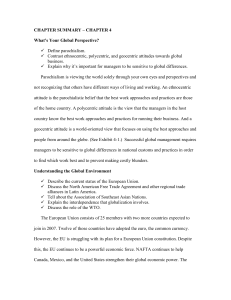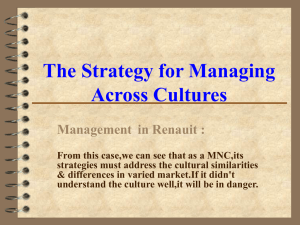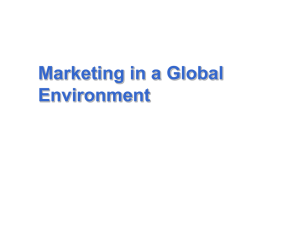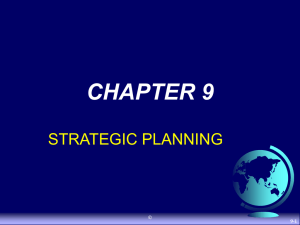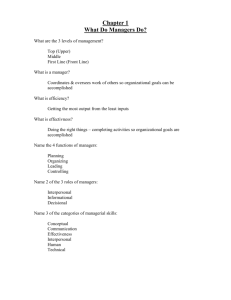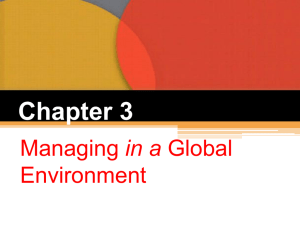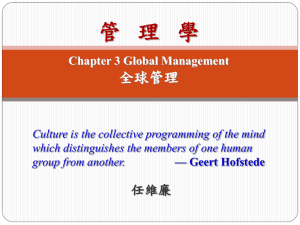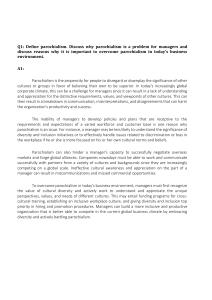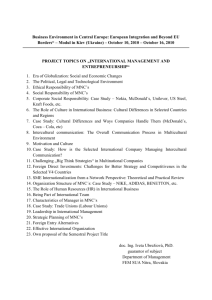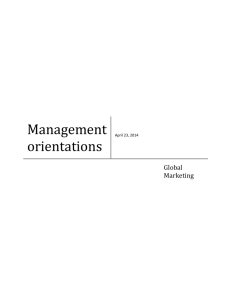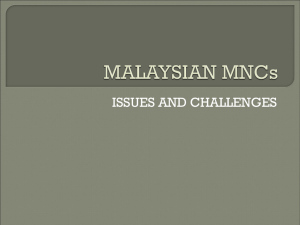Chapter One Managers and Management
advertisement
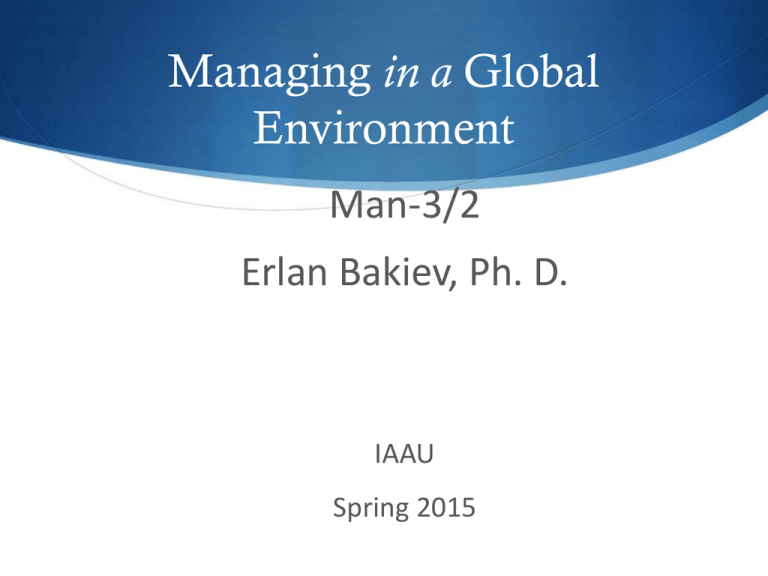
Managing in a Global Environment Man-3/2 Erlan Bakiev, Ph. D. IAAU Spring 2015 Managing in a Global Environment Contrast ethnocentric, polycentric, and geocentric attitudes toward global business Discuss the importance of regional trading alliances and global trade mechanisms Describe the structures and techniques organizations use as they go international Explain the relevance of the political/legal, economic, and cultural environments to global business What’s Your Global Perspective? Parochialism - viewing the world solely through your own perspectives, leading to an inability to recognize differences between people. Ethnocentric Attitude - the parochialistic belief that the best work approaches and practices are those of the home country. More Global Perspectives Polycentric Attitude - the view that the managers in the host country know the best work approaches and practices for running their business. Geocentric Attitude - a world-oriented view that focuses on using the best approaches and people from around the globe. Trading Alliances European Union (EU) - a union of 27 European nations created as a unified economic and trade entity Euro - a single common European currency Exhibit 3-1: European Union Map Trading Alliances (cont.) Nations (ASEAN) - a trading alliance of 10 Southeast Asian nations. North American Free Trade Agreement (NAFTA) - an agreement among the Mexican, Canadian, and U.S. governments in which certain barriers to trade have been eliminated. Exhibit 3-1: ASEAN Map Global Trade Mechanisms World Trade Organization (WTO) - a global organization of 153 countries that deals with the rules of trade among nations. International Monetary Fund (IMF) - an organization of 185 countries that promotes international monetary cooperation and provides advice, loans, and technical assistance. Global Trade Mechanisms (cont.) World Bank Group - a group of five closely associated institutions that provides financial and technical assistance to developing countries. Organization for Economic Cooperation and Development (OECD) - an international economic organization that helps its 30 member countries achieve sustainable economic growth and employment. Types of International Organizations Multinational Corporation (MNC) - a broad term that refers to any and all types of international companies that maintain operations in multiple countries. Multidomestic Corporation - an MNC that decentralizes management and other decisions to the local country. Types of International Organizations (cont.) Global Company - an MNC that centralizes management and other decisions in the home country. Transnational or Borderless Organization - an MNC in which artificial geographical barriers are eliminated. How Do Organizations Go Global? Global Sourcing - purchasing materials or labor from around the world wherever it is cheapest. Exporting - making products domestically and selling them abroad. Going Global (cont.) Importing - acquiring products made abroad and selling them domestically. Licensing - an organization gives another organization the right to make or sell its products using its technology or product specifications. Franchising - an organization gives another organization the right to use its name and operating methods. Going Global (cont.) Strategic Alliance - a partnership between an organization and one or more foreign company partner(s) in which both share resources and knowledge in developing new products or building production facilities. Joint Venture - a specific type of strategic alliance in which the partners agree to form a separate, independent organization for some business purpose. Going Global (cont.) Foreign Subsidiary - directly investing in a foreign country by setting up a separate and independent production facility or office. Exhibit 3-3: How Organizations Go Global The Economic Environment Free Market Economy - an economic system in which resources are primarily owned and controlled by the private sector. Planned Economy - an economic system in which economic decisions are planned by a central government. The Cultural Environment National Culture - the values and attitudes shared by individuals from a specific country that shape their behavior and beliefs about what is important. Global Leadership and Organizational Behavior Effectiveness (GLOBE) program - a research program that studies crosscultural leadership behaviors. Exhibit 3-4: What Are Americans Like? Exhibit 3-5: Hofstede’s Five Dimensions of National Culture Exhibit 3-6: Globe Highlights Contemporary Issues Cultural Intelligence - cultural awareness and sensitivity skills. Global Mind-Set - attributes that allow a leader to be effective in cross-cultural environments. Exhibit 3-7: A Global Mindset Terms to Know Parochialism World Bank Group Ethnocentric attitude Organization for Economic Cooperation and Development (OECD) Polycentric attitude Multinational corporation (MNC) Multidomestic corporation Global company Transnational or borderless organization Geocentric attitude European Union (EU) Euro North American Free Trade Agreement (NAFTA) Association of Southeast Asian Nations (ASEAN) Global sourcing World Trade Organization (WTO) Exporting International Monetary Fund (IMF) Importing Licensing Terms to Know (cont) Franchising Strategic alliance Joint venture Foreign subsidiary Free market economy Planned economy National culture Global Leadership and Organizational Behavior Effectiveness (GLOBE) program Cultural intelligence Global mind-set
